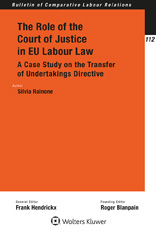The Role of the Court of Justice in EU Labour Law : A Case Study on the Transfer of Undertakings Directive
440 p.
In an unresolved ongoing debate, the Court of Justice of the European Union (CJEU) is often included among the institutional actors responsible for the declining condition of labour law in Europe. Has its case law been more protective of employers' interests than of workers' rights? This innovative book greatly enhances the discussion by bringing to light the judicial lawmaking logic, other than those pertaining to the balancing of social and business values, that drive the CJEU's reasoning in its interpretation of the labour law provisions enshrined in the European Union (EU) law, with particular attention to the directive on transfer of undertakings. Addressing fundamental issues - such as uneven bargaining power, labour as a commodity, coexistence of workers' rights and the market economy - in the context of judicial lawmaking, the author clearly defines the tensions at work:What normative models underlie the approaches of EU institutional policymakers with respect to labour law?ÂÂÂÂDoes the CJEU have it
s.
own vision of the socioeconomic model to which the Union should adhere?How does the CJEU's interpretative approach stand in relation to the transformation processes that regulators impose on labour law?Is the CJEU particularly attentive to the preferences expressed by national governments, especially those from the most politically influential states, or rather reflect the political pressure of the European Commission?What is the role of trans-judicial dynamics in shaping the CJEU's reasoning in labour law cases? The study is extraordinarily thorough, drawing on a wide range of policy documents, scholarly and doctrinal research, and the entire body of the CJEU's case law on transfer of undertakings. The legal arguments that the CJEU has developed over the years are mapped and classified according to their affinity with the labour law functions that underlie them.With its comprehensive assessment of the normative implications of EU policymaking in the labour and social domains, its thorough exploration of the.
CJEU's judicial lawmaking dynamics, and its extensive empirical legal analysis of the CJEU's case law on transfer of undertakings, the book has no peers in revealing the forces that guide the CJEU's decisions in the realm of labour law. Of particular value to scholars and researchers interested in EU social policies and constitutional law, the book will also prove of immeasurable value to labour law practitioners aiming to use the case law of the CJEU, as well as to in-house counsel, industrial relation specialists, and trade unionists. [Publisher's text].
Special access authorizations may apply; please contact us for further information.
-
Information
ISBN: 9789403530161
DISCIPLINES


